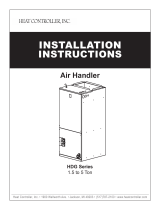.
After the proper equipment combination has been selected, satisfying both sensible and latent
ƽ Outdoor unit location
ƽ Proper equipment evacuation
ƽ Outdoor unit refrigerant charge
ƽ Indoor unit air flow
ƽ Indoor unit blower speed
ƽ Supply and return air duct design and sizing
ƽ System air balancing
ƽ Diffuser and return air grille location and sizing
The second form of heat is called latent heat. This is heat held by the moisture in the air. Removing
this moisture does not affect a thermometer. However, removing the latent heat in the air greatly increase
comfort. A properly sized unit removes both forms of heat, producing a comfortable conditions,
An oversized system cycles on and off quickly and does not properly remove humidify, producing
uncomfortable. The indoor and outdoor equipment combination should be matched by the manufacturer
There are several factors that installers must consider.
and based on engineering data.
conditioning requirements, the system must be properly installed. Proper installation with cerefully
distributed air through adequate duct work will provided a comfortable living space.
and humidity control depend on the correct balance between indoor load and outdoor unit capacity. High
Air conditioning requires a specified air flow. Each ton of air conditioning requires 400 cubic feet of air
per minute (400CFM/TON).
of 3ein the return duct and 4ein the supply duct. This can reduce the cooling capacity of an air
conditioning system by as much as 30%.This means a loss of almost one ton of cooling capacity from a
three ton system.
Air leakage of only 3% in a return duct can cause a 5% loss in system capacity. 3% leakage on a three
Duct systems installed in the conditioned space can be left uninsulated , but a dense 1/2” fiberglass duct
liner reduces blower and air noises, and prevents sweating ducts when humidity levels are high.
Supply and return duct systems in attics and crawl spaces require a minimum 1” of dense duct liner or 2”
fiberglass wrap with a sealed vapor barrier. A leaky vapor barrier results in duct sweating, causing wet
The air distribution system has the greatest effect. On the quality of the installation and the owner satisfaction,
The correct air quantity is critical for correct air conditioning system. Proper operation, efficiency, compressor life
performance and customer's satisfaction and can cause premature component failure.
Duct design and construction should be done with care. System performance can be lowered
Effective duct insulation is essential to prevent loss of capacity and sweating ducts in the cooling mode.
dramatically through bad planning or workmanship. In cooling, a hot attic can cause a temperature gain
ton system is only 30 CFM. Two or three unsealed joints can cause a leak of this size. Sealing the return
and supply ducts result in full system capacity and lower operating costs.
the duct system is totally in the responsibility of the contractor. These are numerous thchnical associations
Low indoor air flow reduces total capacity, and can causes coil icing. Improper air balance will affect system
and reference that recommend correct procedures.
indoor air flow reduces system dehumidification capacity, and can leave the space humid and uncomfoltable.
insulation
does not insulated.
Air supply diffusers must be selected and located carefully. They must be sized and positioned to deliver
Heat transfer through poorly insulated systems can result in over 50%
loss in operating capacity. Sweating
ducts also results in rusting that leads to premature duct failure. Carefully follow the industry practices to
insure a well designed duct system.
treated air along the perimeter of the space. If they are too small for their intended air flow, they can be
noisy. If they are not located properly, they can cause drafts in the rooms. Return air grilles
must be
properly sized to carry air back to the blower. If they are too small they also cause noise. The installers
ensures a comfortable living space.
should balance the air distribution system to ensure proper air flow to all rooms in the home. This
6
Central Air Conditioning Model: Air Handler, HB-D series


















